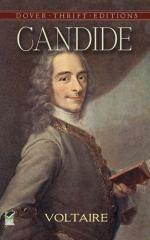|
|
Candide Author/Context
In Candide, Voltaire responds to 18th century historical events and philosophical trends, giving a satirical look at the noble classes, speculative metaphysics, war and the Church. In most of his dramatic, historical and prose works, Voltaire targets tyranny, oppression and the hypocrisy of the Church. As a prolific writer, intellectual leader and political watchdog, Voltaire figures prominently in the 18th century Enlightenment, a time when writers and intellectuals known as "the philosophes" championed religious and social tolerance, the sciences, freedom of thought, and reliance on human reason. According to one biographer, "Voltaire made men think for themselves. He infuriated them either by challenging accepted beliefs, or by questioning political and social conventions" (Hearsey, xi).
Voltaire was born François-Marie Arouet in 1694. He studied literature, the classics, theatre, and religion at the famous Jesuit college, Louis-le-Grand. His father insisted he study law, but he turned to writing instead. He joined the Society of the Temple, a freethinking and irreverent group of nobles and churchmen, and became notorious for his short literary works and mocking quips. In 1717, for his alleged ridicule of the Duke of Orleans, Voltaire was thrown in the Bastille for eleven months. There he completed his tragedy Œdipe, wrote much of La Henriade, and adopted the pseudonym "de Voltaire".
Scandal erupting from publication of the pro-Protestant La Henriade along with a feud with the Chevalier de Rohan-Chabot (he mocked Voltaire for his adopted name) brought Voltaire back to the Bastille in 1726. Voltaire quickly promised to leave France for England, where he spent over two years in exile. Voltaire met influential English writers and philosophers including Pope, Congreve and Swift. Voltaire was impressed with English policies of religious tolerance and free speech, while his circle of friends encouraged his Deist tendencies.
Voltaire returned to France and continued writing plays and historical works. His praise of English society and its religious tolerance the Lettres Philosophiques implicitly criticized his government's despotism and the Church. After spending three years at the court of Frederic the Great, King of Prussia, Voltaire settled in France near Geneva.
His poem about the Lisbon earthquake of 1755 questioned the doctrine of optimism, which he also lampooned in Candide. Optimism held that god's overall scheme offsets all individual misfortunes; god chose this world out of many possible worlds because it was the best option. This provided the famous "sufficient reason", much maligned in Candide, for the supposed perfection of the world. Amongst Voltaire's numerous dramatic and historical works is his treatise on religious tolerance, written after he helped to champion the cause of Jean Calais, a man brutally executed for being Protestant.
Voltaire died in 1778, eleven years before the French Revolution.
Bibliography
"best of all possible worlds" Encyclopœdia Brittanica Online.
Brailsford, Henry Noel, M.A. Voltaire. London: Henry Holt and Company, 1935.
"Calas, Jean" Encyclopœdia Brittanica Online.
Collocoh, TC, M.A., Thorne, Jo, M.A. Chambers Biographical Dictionary, 1984. New York: Cambridge University Press, 1986.
Crystal, David, ed. The Cambridge Biographical Encyclopedia. Cambridge: Cambridge University Press, 1998.
"Deism" Encyclopœdia Brittanica Online.
"ethics" Encyclopœdia Brittanica Online.
"Europe, history of" Encyclopœdia Brittanica Online.
"French Literature" Encyclopœdia Brittanica Online.
Hearsey, John. Voltaire. New York: Harper and Row, 1976.
"philosophe" Encyclopœdia Brittanica Online.
Shellinger, Paul E., ed. St. James Guide to Biography. Chicago: St. James Press Inc., 1991.
Voltaire, Candide, Ou L'Optimisme. Ed. George R. Havens. New York: Henry Holt and Company Inc., 1954.
"Voltaire" Encyclopœdia Britannica Online.
Voltaire. The Portable Voltaire. Ed. Ben Ray Redman. New York: Penguin Books Ltd., 1977.
Waldinger, Renée, ed. Approaches to Teaching Voltaire's Candide. New York: The Modern Language Association of America, 1987.




